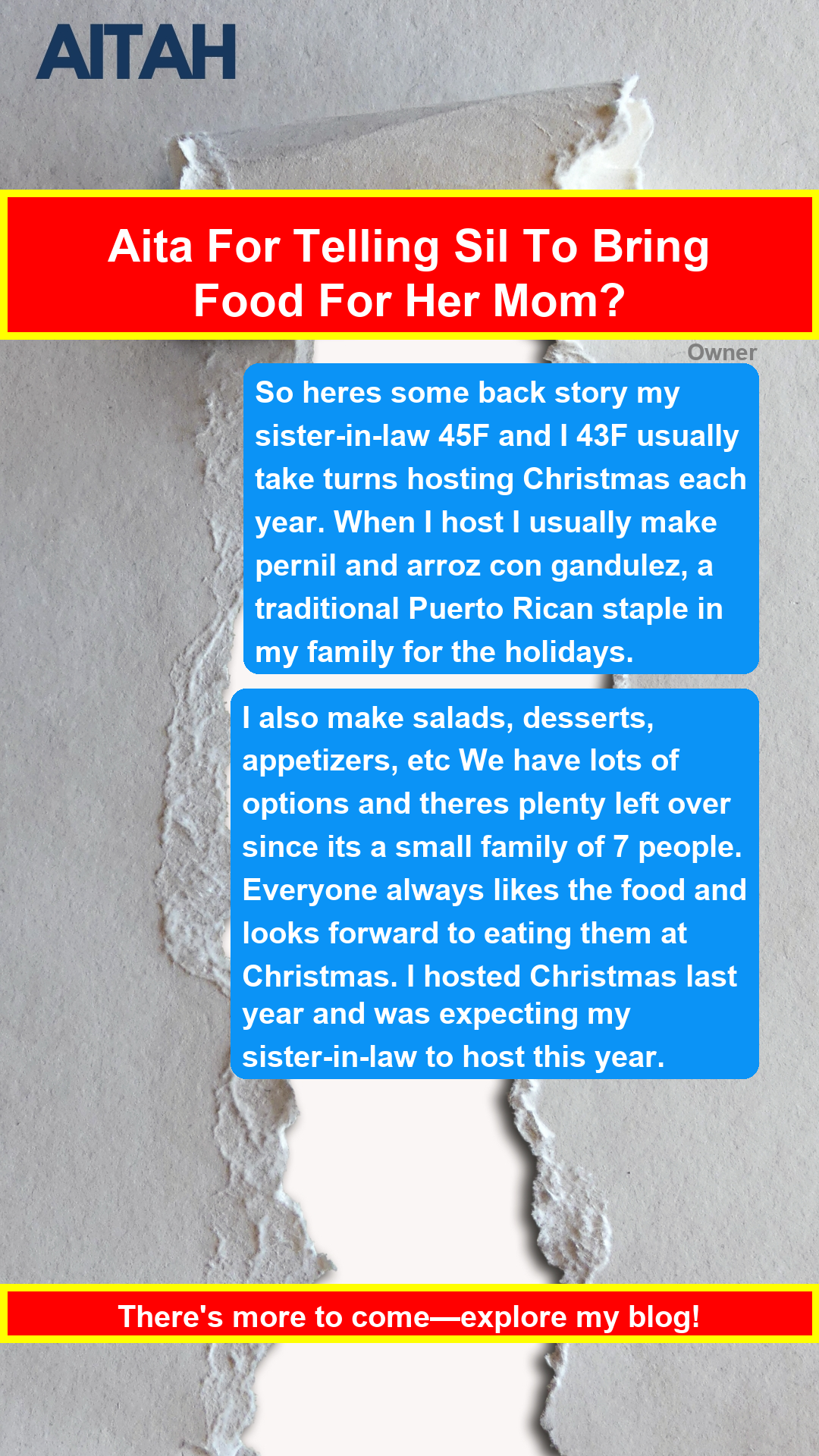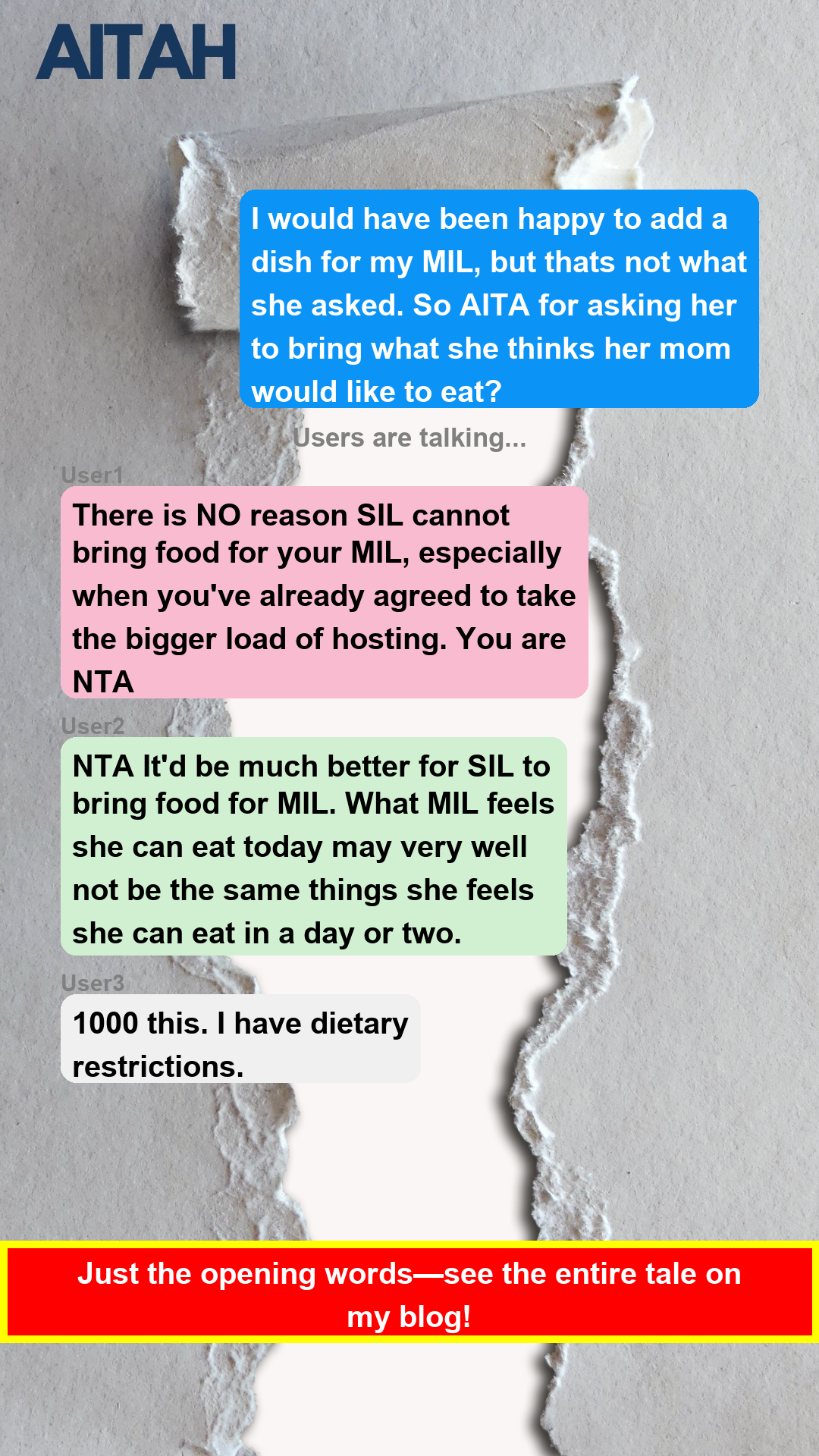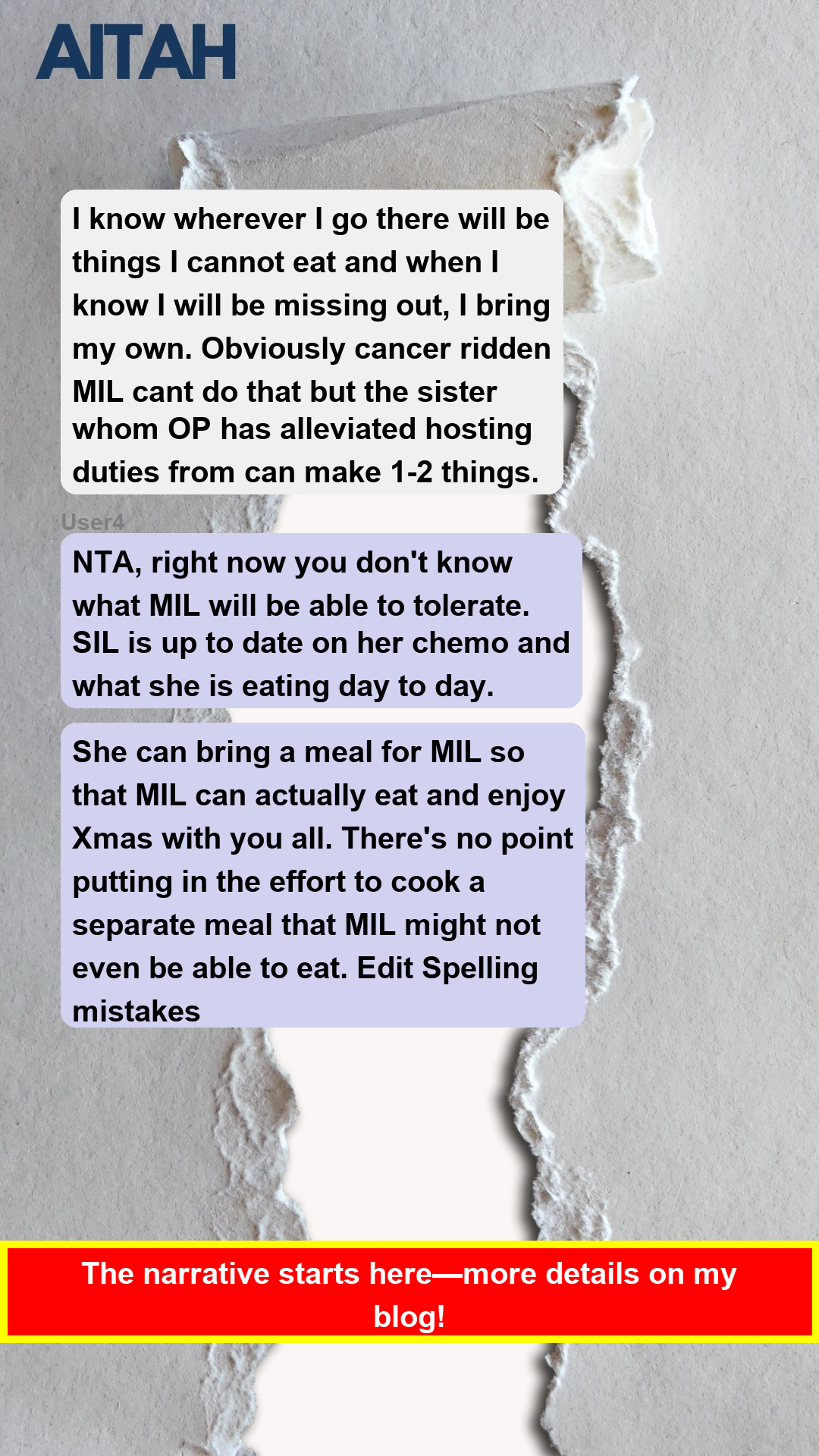AITA for telling SIL to bring food for her mom?
 Image credit: Pixabay (This is example image – Not the actual photo)
Image credit: Pixabay (This is example image – Not the actual photo)
Christmas Dilemma: A Family Feast or a Compromise?
When a woman graciously agrees to host Christmas for her family, she expects to serve her traditional Puerto Rican dishes. However, just days before the holiday, her sister-in-law requests a menu change due to her mother-in-law’s cancer treatment, leaving her feeling conflicted. As she navigates the delicate balance between family expectations and compassion, she wonders if she’s being unreasonable for asking her sister-in-law to contribute a dish instead. This relatable story highlights the challenges of family dynamics during the holidays, where love, tradition, and personal struggles collide.
Family Drama Over Christmas Dinner Plans
In a recent family drama, a conflict arose between two sisters-in-law regarding Christmas dinner preparations. Here’s a breakdown of the situation:
- Background: The narrator (43F) and her sister-in-law (45F) have a tradition of alternating hosting Christmas each year. The narrator typically prepares traditional Puerto Rican dishes, including pernil and arroz con gandulez, which are well-received by the family of seven.
- Change of Plans: After hosting Christmas the previous year, the narrator expected her sister-in-law to take over this year. However, the sister-in-law reached out after Thanksgiving, requesting to host at the narrator’s home due to her mother’s illness and the need for more space.
- Agreement: The narrator agreed to host again, discussing the menu and suggesting that her sister-in-law could bring a side dish if she wished.
- Last-Minute Concerns: Six days before Christmas, the sister-in-law sent a text expressing concerns about the planned menu, stating that her mother, who is undergoing chemotherapy, might not be able to eat the traditional dishes. She suggested they might need to change the menu.
- Communication Breakdown: The narrator was surprised by this request, as she felt unprepared to alter the entire menu at such short notice. She suggested that her sister-in-law could bring a dish suitable for her mother, but did not receive a response.
- Support from Spouse: The narrator’s husband supported her decision, noting that his sister can be controlling at times.
- Self-Reflection: The narrator began to question whether she was in the wrong for asking her sister-in-law to contribute a dish for her mother, feeling guilty about potentially upsetting her.
This situation highlights the complexities of family dynamics and the challenges of conflict resolution during the holiday season. The narrator is left wondering if she is the antagonist in this scenario for wanting to maintain her family’s traditions while accommodating her sister-in-law’s needs.
This is Original story from Reddit
 Image credit: Pixabay (This is example image – Not the actual photo)
Image credit: Pixabay (This is example image – Not the actual photo)
Story
So here’s some backstory: my sister-in-law (45F) and I (43F) usually take turns hosting Christmas each year. When I host, I usually make pernil and arroz con gandules, a traditional Puerto Rican staple in my family for the holidays. I also make salads, desserts, appetizers, etc. We have lots of options, and there’s plenty left over since it’s a small family of 7 people.
Everyone always likes the food and looks forward to eating it at Christmas. I hosted Christmas last year and was expecting my sister-in-law to host this year. But she called me after Thanksgiving to ask if we could have Christmas at our house.
She said she’s been so busy with things and dealing with her mom’s illness; my mother-in-law has cancer and has been getting chemo treatments, and we have more space. Knowing all this, I said I’d be happy to have everyone over. We discussed what I’d make—the usual—and that she could bring a side if she wanted.
So it’s 6 days till Christmas, and I get a text at 7 AM saying that she was thinking about what I’m cooking on Christmas and that she doesn’t think her mom will be able to eat that stuff. I assume due to her treatment, she has some food aversions and that we might have to change it. She said she would call me in the night to talk about it.
I was taken by surprise because I don’t know what else I’d cook and wouldn’t want to disappoint my family by not cooking what they expect. So I replied with what I was going to make and that if she wanted, she could bring something that she thinks her mom would be able to eat. She never replied and didn’t call that night.
My husband said I did the right thing because his sister can be a bit controlling. But I’m thinking I might be the AH because she could be upset that I asked her to bring food for her mom. But I don’t think it’s fair to ask someone to change their entire plan when you tossed the responsibility back to me again this year.
I would have been happy to add a dish for my MIL, but that’s not what she asked. So, AITA for asking her to bring what she thinks her mom would like to eat?
View the Original Reddit Post Here
Summary of Reddit Comments
The top Reddit comments indicate a strong consensus that the original poster (OP) is not at fault (NTA) for expecting the sister-in-law (SIL) to contribute food for the mother-in-law (MIL) during the holiday gathering. Many users emphasize that given the MIL’s cancer treatment and dietary restrictions, it would be more appropriate for the SIL to prepare a few dishes that the MIL can actually eat, rather than expecting OP to accommodate her needs entirely. This perspective highlights the importance of collaboration and understanding in family dynamics, especially during challenging times.
Verdict: NTA
Expert Advice for Resolving the Conflict
Family gatherings can be a source of joy, but they can also bring about tension, especially when health issues are involved. Here are some practical steps to help both the narrator and her sister-in-law navigate this situation with empathy and understanding:
- Open Communication: Encourage both parties to have an open and honest conversation. The narrator should express her feelings about the last-minute changes and the importance of maintaining family traditions, while the sister-in-law should share her concerns regarding her mother’s dietary needs.
- Collaborative Menu Planning: Suggest a collaborative approach to the menu. They can work together to create a list of dishes that accommodate the mother-in-law’s dietary restrictions while still including traditional favorites. This way, both sides feel heard and valued.
- Set Clear Expectations: It’s essential to clarify roles and responsibilities for the dinner. The sister-in-law can be encouraged to take the lead on preparing dishes that cater to her mother’s needs, while the narrator can focus on her traditional recipes. This division of labor can alleviate pressure on both sides.
- Offer Support: The narrator can offer to help her sister-in-law with the preparation of the new dishes, creating a sense of teamwork. This can also strengthen their relationship and foster a supportive environment during a challenging time.
- Be Flexible: Both parties should remain open to adjustments. If the sister-in-law feels strongly about certain dishes, the narrator can consider incorporating them into the meal, even if they are not traditional. Flexibility can lead to a more harmonious gathering.
- Focus on Family Togetherness: Remind each other that the ultimate goal is to spend quality time together as a family. Emphasizing the importance of family support during difficult times can help shift the focus from the food to the shared experience.
- Follow Up: After the holiday, it’s beneficial for both parties to check in with each other. Discuss what went well and what could be improved for future gatherings. This can help build a stronger foundation for future interactions.
By approaching the situation with empathy and a willingness to collaborate, both the narrator and her sister-in-law can work towards a resolution that honors family traditions while accommodating the needs of all family members. Remember, the holiday season is about love, support, and togetherness.
Join the Discussion
 Image credit: Pixabay (This is example image – Not the actual photo)
Image credit: Pixabay (This is example image – Not the actual photo)
What do you think? Would you have handled this differently?
Share your thoughts below! Vote: Do you agree with Reddit’s verdict?







